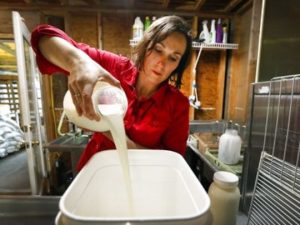I started the Food Safety Network (the original FSN) as an incoming graduate student in 1993 in the wake of the Jack-in-the-Box outbreak, combining my science and journalism learnings, and because a constant refrain I observed was, I never knew foodborne illness could be so serious.
 That’s why I continue to do it as a form of community service (I haven’t been paid since 2016).
That’s why I continue to do it as a form of community service (I haven’t been paid since 2016).
There are now at least 15 children sick with E. coli in Tennessee that has now been linked to consumption of raw milk from French Broad Farm.
According to Kristi L Nelson of Knox News, Jordan and Stephanie Schiding wanted to give their children every health advantage.
That’s the reason the Schidings, two months ago, signed up for a local cow-share program after they read about the health benefits of unpasteurized milk.
Instead, 18-month-old Genevieve and 3-year-old Anthony contracted an illness caused by E. coli bacteria and ended up with kidney failure in the pediatric intensive care unit at East Tennessee Children’s Hospital — two of 12 local children hospitalized with E. coli since the end of May.
Knox County Health Department staff told the Schidings the E. coli infection was likely linked to the consumption of raw milk from French Broad Farm. On Thursday, the health department lifted its directive that requested French Broad Farm temporarily cease operations. But health department Director Dr. Martha Buchanan reiterated that consuming raw milk is always risky and health officials recommend the public consume only pasteurized milk and dairy products.
Jordan Schiding said he and his wife knew there was “potential” for food poisoning from unpasteurized milk, which both adults drank with seemingly no serious effects, but “we were definitely not aware that anything like this was remotely possible.”
The Schiding children seem to have turned a corner, he said, with Anthony discharged Friday afternoon and Genevieve still hospitalized but out of intensive care.
But what started as a supposed stomach bug May 31 turned into a terrifying experience that traumatized both the children and their parents, who had to watch them suffer.
 Schiding said the family brought Genevieve to the emergency room at Children’s Hospital May 31 after she became seriously dehydrated with diarrhea and vomiting. As she was being admitted, Anthony also began vomiting.
Schiding said the family brought Genevieve to the emergency room at Children’s Hospital May 31 after she became seriously dehydrated with diarrhea and vomiting. As she was being admitted, Anthony also began vomiting.
The hospital rehydrated the children and discharged them a few hours later. Schiding believes they were among the first children related to the current cluster of E. coli cases to come to Children’s Hospital.
Two days later, after both children continued to get sicker, the Schidings brought them back to the hospital. This time, hospital staff took a stool sample from Genevieve, which tested positive for E. coli, and then from Anthony, who also tested positive. Both children were admitted, and Knox County Health Department contacted the couple the next day, he said.
The Schidings knew little about E. coli; certain strains produce a toxin, Shiga, that can cause a chain of reactions in the body — hemolytic uremic syndrome — resulting in clots in the small blood vessels in the kidneys that cause kidney failure. The very young, the very old and people whose immune systems are already compromised are more susceptible to HUS.
Four children admitted to Children’s so far have had HUS, including Genevieve and Anthony. Though Anthony wasn’t quite as sick as his sister, both had surgery to implant central lines so they could get fluids, dialysis and blood transfusions, Schiding said. Anthony had three days of dialysis, Genevieve seven.
In addition, Anthony’s central lines became infected with staph, Schiding said, but the antibiotics typically prescribed to treat staph are too hard on the kidneys to give a child with HUS, so doctors had to use a less common medication, which has seemed to work.
“Obviously, we were freaked out a little bit,” Schiding said. “It seemed like he had started turning the corner” until he spiked a fever of 104.9 and tested positive for staph.
Schiding said his family no longer will consume raw milk.
